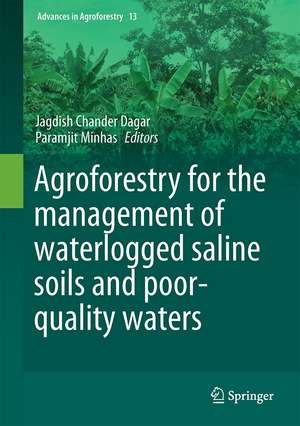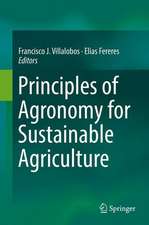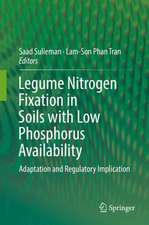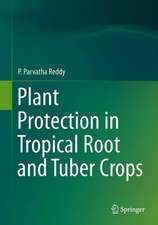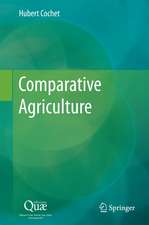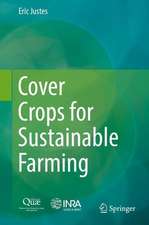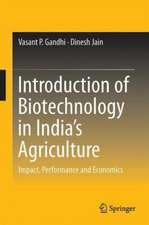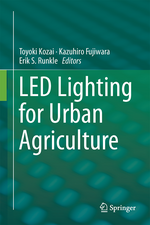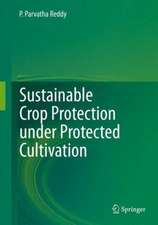Agroforestry for the Management of Waterlogged Saline Soils and Poor-Quality Waters: Advances in Agroforestry, cartea 13
Editat de Jagdish Chander Dagar, Paramjit Minhasen Limba Engleză Hardback – 24 feb 2016
| Toate formatele și edițiile | Preț | Express |
|---|---|---|
| Paperback (1) | 832.69 lei 38-44 zile | |
| Springer India – 14 mar 2019 | 832.69 lei 38-44 zile | |
| Hardback (1) | 843.65 lei 38-44 zile | |
| Springer India – 24 feb 2016 | 843.65 lei 38-44 zile |
Preț: 843.65 lei
Preț vechi: 1110.07 lei
-24% Nou
Puncte Express: 1265
Preț estimativ în valută:
161.43€ • 168.55$ • 133.61£
161.43€ • 168.55$ • 133.61£
Carte tipărită la comandă
Livrare economică 01-07 aprilie
Preluare comenzi: 021 569.72.76
Specificații
ISBN-13: 9788132226574
ISBN-10: 8132226577
Pagini: 210
Ilustrații: X, 210 p. 39 illus., 10 illus. in color.
Dimensiuni: 178 x 254 mm
Ediția:1st ed. 2016
Editura: Springer India
Colecția Springer
Seria Advances in Agroforestry
Locul publicării:New Delhi, India
ISBN-10: 8132226577
Pagini: 210
Ilustrații: X, 210 p. 39 illus., 10 illus. in color.
Dimensiuni: 178 x 254 mm
Ediția:1st ed. 2016
Editura: Springer India
Colecția Springer
Seria Advances in Agroforestry
Locul publicării:New Delhi, India
Public țintă
ResearchCuprins
1. Introduction.- 2. High Rate Transpiration Systems (HRTS) for Control of Waterlogging.- 3. Bio-Management Options for Greening and Water-table Control.- 4. Controlling Seepage and Salinity Using Trees: Australian Experiences.- 5. Response of Woody Plants to Flooding and Salinity.- 6. Agroforestry to Enhance Farm Productivity in Coastal Waterlogged Areas.- 7. Safer Disposal of Wastewater for Greening the Urban and Peri-urban Areas and Revenue Generation.- 8. Tree-based Integrated Agricultural Model for Enhancing farm Productivity of Waterlogged Areas.- 9. Biomanagement Options for Carbon Sequestration, Ecosystem Services and Mitigating Climate Change.- 10. Comparison of Models for Estimating Evapo-transpiration of Irrigated Eucalypt Plantations.- 11. Biomanagement: Socio-economic and Policy Issues and Challenges.
Notă biografică
Dr. Jagdish Chandra Dagar is the former Assistant Director General of Agronomy and Agroforestry Division at Krishi Anusandhan Bhawan II Pusa New Delhi.His list of publication is mentioned below:Papers in Journal with NAAS Index >6 - 31 Papers in Journal with NAAS Index 3-6 - 27Total number of Books authored - 03Total number of Books edited - 03Total Papers published in Peer-reviewed Journals – 125Papers published in International Proceedings - 12Papers published in National Proceedings - 13 Chapters contributed in Books – 29
Textul de pe ultima copertă
Land degradation caused by salinity and waterlogging is a global problem afflicting about one billion hectares and endangering the food security of at least 75 countries. Since the social, economic and environmental costs of on and/off-farm reclamation techniques are high, agroforestry is now emerging as a potential tool, not only for arresting salinity and waterlogging, but also for other environmental services like mitigating climate change, sequestering carbon and restoring biodiversity. This publication addresses the vital issues, principles and practices related to rehabilitation using agroforestry and includes many site-specific case studies from a number of the world’s typical catchments. Written by leading researchers, the book is a must, not only for scientists whose research interests lie in soil salinity, waterlogging and poor-quality waters, but also policy makers, environmentalists, students, and educationists alike. More importantly, it contributes to reversing the salinity trends and ensuring the livelihoods of resource-poor farming families living in these harsh agro-ecosystems.
Caracteristici
Comprehensive information for a relatively new field Emphasizes on new technology for combating waterlogging Useful for policy makers, environmentalists, scientists, administrators and research institutes
